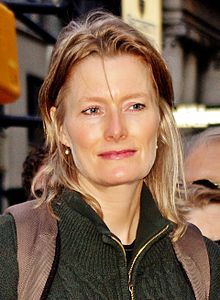Jennifer Egan
| Jennifer Egan | |
|---|---|

Egan at Occupy Wall Street, November 2011
|
|
| Born |
September 7, 1962 Chicago, Illinois |
| Occupation | novelist |
| Citizenship | United States |
| Alma mater |
University of Pennsylvania (BA) Cambridge University (MA) |
| Genre | Fiction, Novel, Short story |
| Notable works | Look at Me (novel, 2001), A Visit from the Goon Squad (novel, 2010) |
| Notable awards | National Endowment for the Arts Fellowship, Guggenheim Fellowship, Pulitzer Prize for Fiction, National Book Critics Circle Award |
| Website | |
| www |
|
University of Pennsylvania (BA)
Jennifer Egan (born September 7, 1962) is an American novelist and short story writer who lives in Fort Greene, Brooklyn. Egan's novel A Visit from the Goon Squad won the 2011 Pulitzer Prize for Fiction and National Book Critics Circle Award for fiction.
Egan was born in Chicago, but grew up in San Francisco. After graduating from Lowell High School, she majored in English literature at the University of Pennsylvania. While an undergraduate, Egan dated Steve Jobs, who installed a Macintosh computer in her bedroom. After graduating, Egan spent two years at St John's College, Cambridge supported by a Thouron Award. She has published short fiction in The New Yorker, Harper's, Zoetrope: All-Story, and Ploughshares, among other periodicals, and her journalism appears frequently in The New York Times Magazine. She has published one short story collection and four novels, among which Look at Me was a finalist for the National Book Award in 2001.
Egan has been hesitant to classify A Visit from the Goon Squad as either a novel or a short story collection, saying, "I wanted to avoid centrality. I wanted polyphony. I wanted a lateral feeling, not a forward feeling. My ground rules were: every piece has to be very different, from a different point of view. I actually tried to break that rule later; if you make a rule then you also should break it!" The book features genre-bending content such as a chapter entirely formatted as a Microsoft PowerPoint presentation. Of her inspiration and approach to the work, she said, "I don’t experience time as linear. I experience it in layers that seem to coexist...One thing that facilitates that kind of time travel is music, which is why I think music ended up being such an important part of the book. Also, I was reading Proust. He tries, very successfully in some ways, to capture the sense of time passing, the quality of consciousness, and the ways to get around linearity, which is the weird scourge of writing prose."
...
Wikipedia
